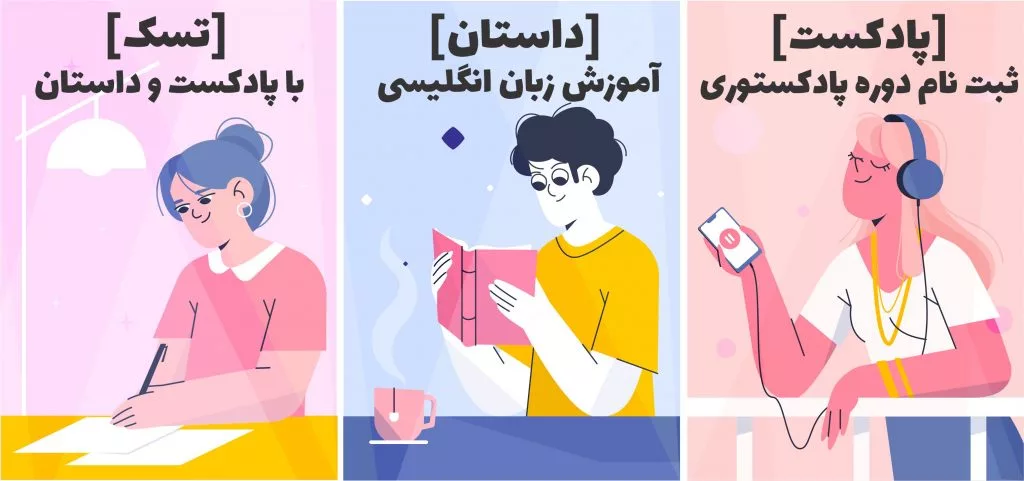پادکست انگلیسی BBC – کنترل خشم
در پادکست انگلیسی BBC – کنترل خشم ، درباره خشونت و کنترل خشم صحبت میشه. هنگامی که کسی با خشونت و عصبانیت با شما برخورد میکند و یا به شما تعرض میکند شما اگر بتوانید خشم خود را کنترل کنید و بر نفس خودتان غلبه کنید شخص مقابل را کلافه تر و سردرگمتر میکنید، زیرا آن شخص به دنبال غم و ناراحتی شماست و این عکس العمل شاید حتی متنبه هم شود.
سوال پادکست انگلیسی BBC – کنترل خشم :
Which country has the oldest gun control laws in the world?
a) USA
b) Iceland
c) Japan
به پادکست خوب گوش کن تا جواب رو پیدا کنی.
اگر می خوای گوش دادن به پادکست تا حد امکان برات ساده و کارآمد باشه مراحل زیر را دنبال کن:
هر روز به پادکست گوش کن. وقتی براش یه وقت ثابت در روز در نظر بگیری برات تبدیل به عادت میشه و این عادت هرروز پیشرفت میکنه.
پادکستی رو پیدا کن که موضوعش برات جالب باشه. وقتی از خود موضوع لذت ببری یادگیری هم برات لذتبخش میشه.
به پادکستی گوش کن که transcript یا متن داره. این بهت کمک می کنه تا کلمات و عبارات جدید رو به سرعت در متن پیدا کنی و ساختار انواع مختلف جمله رو خوب یاد بگیری.
پس از گوش دادن به پادکست با متن، در مرحله بعدی سعی کن بدون نگاه کردن به متن این کار رو انجام بدی. این کار مهارت شنیداری رو تقویت می کنه و کمک می کنه تا انگلیسی زبانان بومی را راحت تر درک کنی، حتی اگر خیلی سریع صحبت کنن.
اگه به پادکست انگلیسی گوش کردی و نتونستی کامل متوجه اش بشی، ناامید نشو. پادکست هایESL -English as Second Language بیشماری وجود دارن که برای سطوح مختلف، از ابتدایی تا پیشرفته طراحی شدن. مطمئنا هر روز می تونین یه پادکست مناسب با سطح خودت پیدا کنی.
فراموش نکن که هرچی بیشتر تمرین کنی در اون مهارت رشد میکنی! به قول انگلیسی ها: Practice makes perfect
واژگان کلیدی پادکست انگلیسی BBC - کنترل خشم
| معنی به فارسی | معنی به انگلیسی | واژه |
| با عجله جایی را ترک کردن | to leave somewhere in a hurry | to shoot off |
| عبااتی برای اجازه دادن به کسی که سوالی بپرسد و یا حرف بزند | an expression giving permission for someone to ask a question or speak. | fire away |
| مهار کردن | prevent someone from moving | restrain |
| تشدید | become less intense | de-escalate |
| روحیهی نظامی، نظامی گری | to equip or use something or someone like an army | militarise |
| مسابقه جنگ افزاری | a competition between two groups to gain more weapons than the other group | arms race |
BBC 6 minute English -Gun control without guns

برای دانلود پادکست روی سه نقطه سمت راست کلیک و گزینه Download را انتخاب کنید.
متن پادکست انگلیسی BBC - کنترل خشم
Dan
Hello and welcome to 6 Minute English– the show that brings you an interesting topic, authentic listening practice and vocabulary to help you improve your language skills. I'm Dan…
Neil
And I'm Neil. In this programme we'll be discussing armed police, as well as teaching you six new items of vocabulary, of course.
Dan
Can we get this done quickly today Neil? Only I've got to shoot off to a party later.
Neil
Shoot off meaning leave quickly. Of course we can. And it's funny that you should mention shooting because our topic this week is gun control without guns.
Dan
Is that so? I have a question about that for you.
Neil
Fire away then.
Dan
Fire away, an expression giving permission for someone to ask a question or speak. So, which country has the oldest gun control laws in the world? Is it a) USA, b) Iceland or c) Japan?
Neil
I'm going to guess b) Iceland, just because I've never been there.
Dan
Well, we'll find out if you're right a bit later on. Now, imagine the scene. You are a police officer who has been called out to deal with an incident. When you arrive on scene you find a dangerous criminal. Do you reach for a gun, or a blanket?
Neil
It's got to be a gun.
Dan
Well, in most countries in the world you'd be right, but not in Japan. Despite carrying guns, Japanese police almost never use them. Instead they rely on a combination of martial arts and in many cases where a person is violent, they bring out the futon – which is a kind of blanket – and they wrap them up and restrain them, or prevent them from moving.
Neil
You're pulling my leg.
Dan
Nope! Listen to Japanese journalist Anthony Berteaux describe the situation:
INSERT
Anthony Berteaux, Japanese Journalist
What most Japanese police will do is to get huge futons and essentially roll up the person who is being violent or drunk into a little burrito and carry them back to the station, and calm them down. The response to violence is never violence, it's always to de-escalate it.
Neil
So, they safely restrain the person and wait for the situation to de-escalate, or become less intense.
Dan
Unless a criminal has a gun, Japanese police never fire their weapons.
Neil
Surely that means that the criminals always have the advantage then?
Dan
You'd think so, but no. It seems that guns don't really feature in crimes much in Japan.
Neil
Well, that's astonishing. So do you think the criminals don't carry guns because the police don't carry guns or that the police don't carry guns because the criminals don't carry guns?
Dan
Wow, that makes my head hurt! Well I don't know, but listen to what Iain Overton, the Executive Director of Action on Armed Violence says about armed police in society.
INSERT
Iain Overton, the Executive Director of Action on Armed Violence
The American model has been 'militarise the police', but the challenge I have is that there is very little evidence that a more militarised police results in a more peaceful society.And I'm very concerned that if you have too many police pulling out guns at the first incidence of crime then you lead to a miniature arms race between police and criminals.
Neil
So, America tends to militarise its police meaning to equip them and use them as an army…
Dan
…and that causes an arms race with the criminals, which is a competition between two groups to have more weapons than the other group.
Neil
He also said that there's not a strong connection between armed police and a peaceful society. So, does that mean that Japanese society is more peaceful?
Dan
Well, violent crime still happens there, but criminals tend to carry other weapons, such as swords and knives, but at least it's a step in the right direction. Now, can you remember the quiz question I asked?
Neil
I think so. You asked me which country has the oldest gun control laws in the world? Is it a) USA, b) Iceland or c) Japan? And I said b) Iceland.
Dan
Well, I'm sorry Neil, that's not right. But, don't shoot the messenger, OK? It's Japan, which implemented its gun control laws in 1685.
Neil
How interesting. Now, let's take a look at the vocabulary from this programme.
Dan
Sure, we had shoot off. If you shoot off, it means you leave somewhere in a hurry. What type of verb is it Neil? Can you give us an example?
Neil
It's a phrasal verb so it's used conversationally and usually in an informal context. As for an example, when he heard his wife was sick, he shot off to the hospital. Synonyms could be dash off or run off. Next we had fire away. Now, fire away is an expression giving permission for someone to ask a question or speak. Can you think of any other ways to say the same thing, Dan, if I said, can I ask you a question?
Dan
I'd say yes, of course, go ahead, please do, or by all means. Restrain. If you restrain someone, you prevent them from moving. In another sense, you might restrain yourself from doing something – for example: eating chocolate! Have you ever had to restrain your children from anything, Neil?
Neil
I have to restrain my children all the time, Dan, otherwise they would fight like mad. I have to pull them apart and restrain them. OK, de-escalate –If something de-escalates, it becomes less intense. This is often used in the context of conflicts or argument. Can you think of a historical example, Dan?
Dan
Well, in the 1960s the Cuban missile crises escalated over a period of two weeks and de-escalated only after diplomatic negotiations were successful. But it was pretty close to World War 3 at one point! Militarise. If something is militarised, it is equipped and used like an army. Give me an example of people who have become militarised, Neil.
Neil
Yes, when I was a student in the United Kingdom some of the foreign students had to go home to take part in national service – that's join the army for a couple of years – so they became militarised. Now, an arms race. An arms race is a competition between two groups to gain more weapons than the other group. Got an example of that, Dan?
Dan
The most famous example of this is the Cold War. Both the USSR and the USA became involved in an arms race to stockpile as many nuclear weapons as possible. Well, that's the end of today's 6 Minute English. Please join us again soon!
Neil
And we are on social media too, so make sure to visit us on Facebook, Twitter, Instagram and YouTube.
Both
Bye!
امیدوارم از پادکست انگلیسی BBC - کنترل خشم لذت برده باشید.
گوش دادن به پادکست روش خوبی برای تقویت مهارت شنیداری و هم چنین یادگرفتن کلمات در بستر یک موضوع خاصه که این به تقویت مهارت مکالمه انگلیسی نیز کمک زیادی می کنه.
اگه تو هم از اون آدمهایی هستی که از گوش دادن به پادکست لذت می بره برات یه خبر خوب دارم! آموزشگاه زبان انگلیسی 24talk یه دوره طراحی کرده مبتنی بر پادکست و داستان کوتاه به اسم "پادکستوری - Podcastory". این دوره سعی کرده یادگیری زبان انگلیسی رو مناسب با نیاز و سطح زبان آموز به یه فرایند بسیار مفرح، موثر، سریع و کم هزینه تبدیل کنه.
همین الان می تونی با کلیک روی عکس زیر و ثبت نام در دوره ی آموزش زبان انگلیسی با پادکست و داستان ۲۴talk اولین و مهم ترین قدم رو برای یادگیری زبان انگلیسی برداری. وقت رو از دست نده!
دوره پادکستوری آکادمی مجازی 24talk
برای شنیدن دیگر پادکست ها، به بخش پادکست در مرکز آموزش رایگان مراجعه نمایید.









